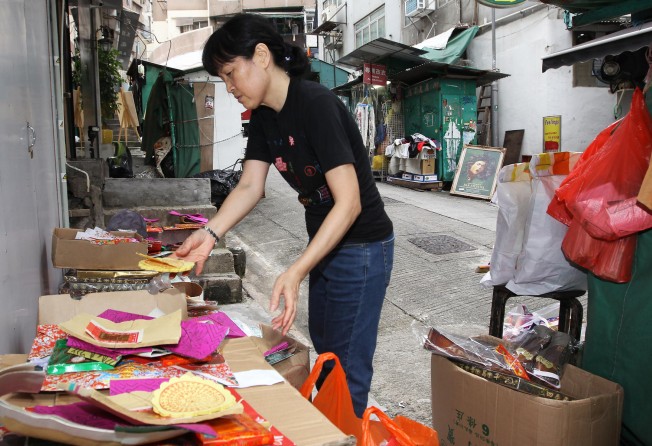
Chow Kee, a famous paper craft shop in Hong Kong, closes down
The man behind Chow Kee, offering traditional paper lanterns and decorations, calls it a day

Chow Kee, the famous paper craft shop on Elgin Street, Central, is no longer.

Chow Kee provided paper lanterns and other items in Hong Kong for more than 70 years.
Ahead of the Hungry Ghost Festival last week, Chan's daughter, Ada, stood with bags of candles, incense sticks, paper clothes, shoes and other offerings on the steps of the now-closed shop. She had told her mother she would take a couple of days off work to provide the items for long-standing customers.
"This area used to be very vibrant, with market stalls along the streets," she said. "All our neighbours would come and hang the bags of food that they had bought earlier in the day on hooks on our metal door and then carry on shopping and collect their bags in the evening. So we had a nice social network."
Chan was famous for his big-eyed goldfish lanterns made from bamboo sticks and crêpe paper, a humorous take on the traditional lanterns offered for the Mid-Autumn Festival.
Every year, he would craft the god king or hellish king for the Hungry Ghost Festival, creating a figure five metres tall, although he wouldn't take any measurements beforehand.
Other figures included the Seven Sisters dummy set, illustrating a melancholy Chinese fairy tale.
The glory days of the trade were the 1950s and 1960s, when Chan's handiwork would be used for big advertisements for restaurants and shops during festivals. He used to make paper decorations for Cantonese opera groups and also firecrackers before they were banned. But by the end of the 1990s, paper lanterns had been replaced in large measure by plastic inflatables.
"We came here for many years to get our lanterns," said heritage activist Katty Law Ngar-ning, 46, the convenor of the Central and Western Concern Group. "I would bring my young children. It's so sad to see that this area is no longer accommodating these kinds of businesses."
Over the decades, Chan's son Edward wrote in a book about his father's craft. People would suggest Chan use machinery, but he insisted on using only basic tools so he could be involved in every detail of the process.
On Friday, as the local community marked the Hungry Ghost Festival, Wong Kun-oi, chairman of the 30 House Yue Lan Association, said he was sad Chan would no longer be doing his unique paper craftwork or creating the annual ghost king.
"I miss Mr Chan and his work. He had very good craftsmanship, very detailed," Wong said.